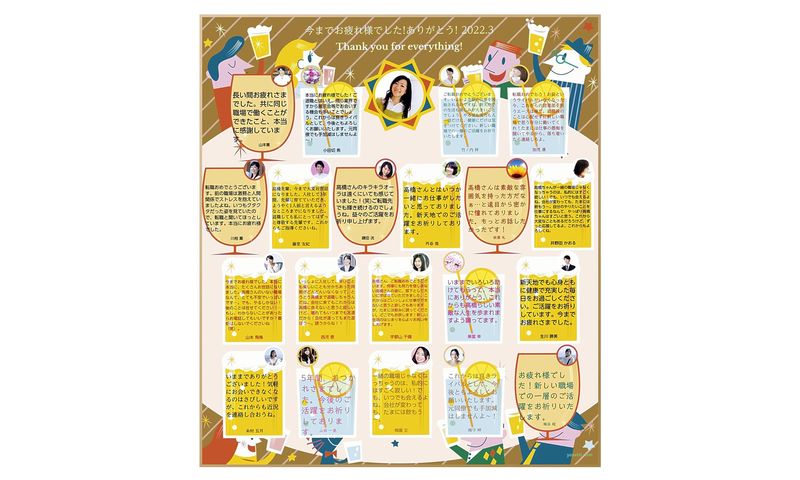March 22, 2022
TOKYO – A staple of farewell parties in Japan is a collection of written messages called yosegaki, which friends and colleagues present to the departing person, often on a fancy cardboard card called a shikishi.
With the COVID-19 crisis having made it difficult for people to hold in-person farewell parties in large groups, online versions of yosegaki have come into the spotlight. This enables well-wishers to conveniently express their gratitude as a group without actually gathering in one place.
“It reminds me of many things that happened and makes me feel nostalgic,” said Naoki Okude, 29, smiling shyly. It was late February, and he was looking at messages sent to him by about 70 people, including former colleagues at an information technology company in Shinagawa Ward, Tokyo.

A yosegaki shikishi card created by yosetti. There are more than 200 designs to choose from.
He was employed by the company as a new graduate and worked there for four years before deciding to move on and start working at another IT company.
To give him an appreciative send-off, his boss Shinpei Yanagi, 38, decided on a digitally produced yosegaki service called “yosetti.”
A user chooses a yosegaki design and sends participants a dedicated URL. After everyone has input their messages, the yosegaki is printed on a shikishi and delivered to a designated address. The service starts from ¥2,948. It is also possible to view the yosegaki online.
The company operating the service said it made about 60,000 yosegaki shikishi cards in 2019. After the pandemic took hold, the company made about 150,000 shikishi in 2020 and 270,000 last year.
The approximately 70 people Yanagi invited to take part in the yosegaki included those working from home and former colleagues who have left the company.
“I could collect messages from so many people because it is online,” Yanagi said with a smile.
There are other yosegaki services as well. One that conveys the sense of a luxury gift is Sugoyose, run by IT service company iUM in Tokyo, which can compile up to 246 messages into a book.

Messages can be compiled into a book through Sugoyose.
The company came up with the idea of a book-type yosegaki after hearing an employee’s opinion that shikishi cards are difficult to preserve. It is also possible to add a photo on each page to make the book look like a photo album. The price of the book starts at ¥1,980, including bookbinding.
Another popular service sends messages of gratitude through videos. Gifvie is one such service that can edit and connect up to 64 video clips, each lasting about 10 seconds, to make a gift movie. The service is run by I&CO Tokyo, a company that supports corporate branding strategies.
Since February, more and more people have been using the service to celebrate graduations from schools and kindergartens, according to the company. The fee starts at ¥550.
“There are students who have spent most of their school lives in the pandemic. I hope people will use our service as a memento of celebrating important occasions,” said an I&CO Tokyo employee in charge of the service.
Tasuku Kashiwamura, a researcher of Dai-Ichi Life Research Institute Inc., said digitally produced yosegaki can have a good effect on people in some groups or entities. They may help foster a sense of unity when some schools are still holding classes online.
“It has advantage of being digital, so users can easily make yosegaki shikishi cards of very high quality. It will spread to wider generations of people from now on, too,” Kashiwamura said.

